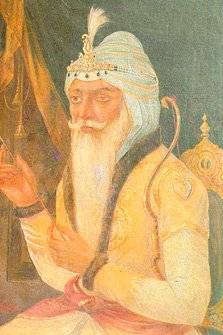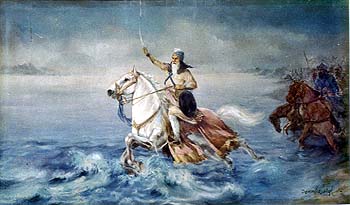
MAHARAJA RANJIT SINGH JI
THE LION OF PUNJAB

Maharaja Ranjit Singh was born in Gujranwala, India on November 13th 1780. He was one of the most remarkable men in Indian history. He was left a small inheritance from his father, Maha Singh, namely the town of Gujranwala town and some of the surrounding villages. However by the time of his own death and through his own efforts he turned his inheritance into an empire. His reign extended over undivided Punjab,Kashmir, Ladakh, Multan and many parts of Afghanistan.
Though he had no formal learning, his intuitive intelligence, warm personality, and his ability to see the good in people, were the secrets to his successes. Among his empire the built the most disciplined and efficient armies that Asia had ever seen. However, the most precious key to his success was that he was loved by people, who gave him the title of Maharaja.
Despite being called Maharaja, Ranjit Singh preferred to be called Bhai Sahib, (Elder Brother) or Singh Sahib. He did not even sit on a lavish throne, he always sat on a plain simple chair. Once there were no monsoon rains and the crops of wheat had withered on their stalks, Maharaja Ranjit Singh ordered that those who did not have any wheat could take as much as they wanted from his granaries. In the evening he would dress up in the rags of a beggar and go down to the streets to see if his orders were being carried out, and if the people wanted anything else. One evening, as he was walking on the streets he met an old man sitting on a sack of wheat. The Maharaja asked him why he was sitting in the dark and not going home. To this the old man replied that his sack was too heavy for him to carry home, and that his family are alone at home awaiting his return. With this the Maharaja picked up the sack and took it to the old mans home himself. The old man had never guessed that the Maharaja was carrying his wheat, but when Ranjit Singh was about to leave his home, his shawl fell off and the old man realised that the Maharaja was in his home. It was deeds like this that made the people love Ranjit Singh even more.
His rule was marked with prosperity and justice. In 1801 he had coins struck in the name of the Sikh Gurus. Though himself a Sikh he always respected the religions that the people under his reign followed and never treated anyone unfairly. He helped them to restore or rebuild their temples and mosques, and allowed them to practise their religion without fear.

Much of his army reflected the fairness of his reign, along side Sikhs, Hindu and Muslim people joined the army and all were rewarded on the basis of their bravery and hard work. His closest companions were from different backgrounds, his Prime Minister, Dhain Singh was a Hindu, and his chief artillery commander, Mian Ghause was a Muslim. Maharaja Ranjit Singh was the broadest minded and secular ruler that India has ever seen.
At one time Ranjit Singh had learnt that a Maulvi, who had spent many years making a beautiful copy of the Quran wanted to take it abroad, because he could not find any Muslim in Punjab who could afford the Rs.5,000 for it. So the Maharaja gave the Maulvi Rs.10,000 for the copy and said
"Although I am not a Muslim, I will cherish the holy book as best as any Muslim brother would."
At the Hindu festival of Holi, he would distribute red paint among his troops and join them as they all sprayed paint n each other.
The most famous act of kindness was when he ordered that the Harmandir Sahib be marbled and covered with gold. Maharaja Ranjit Singh was compassionate, but also very brave. By the age of nineteen or twenty he had captured Lahore. He decided to extend his kingdom and to do so set about shaping the best army. He hired officers from France, Italy and other European countries to give his soldiers the best training, he never discriminated against anyone, and encouraged them to follow their religion and coustoms as soldiers as well.
He conquered many towns, but unlike other conqureres he always helped to rebuilt each place after he had taken it over and made sure that the people did not loose out.
- BACK -